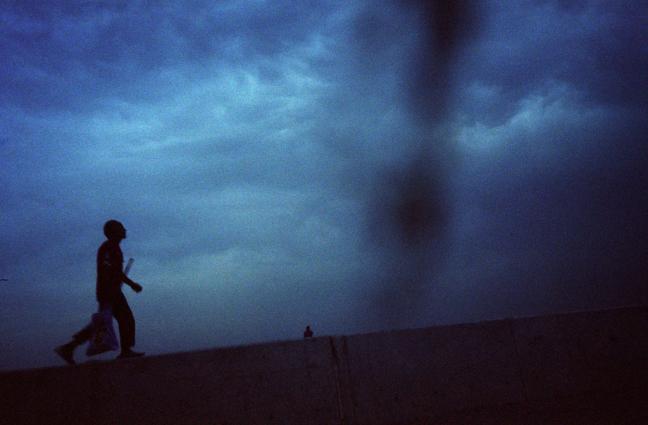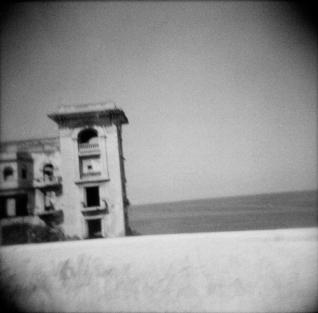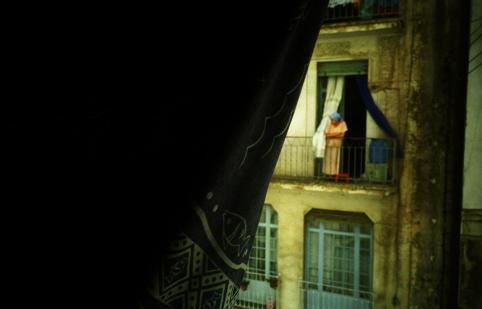When he went to Algeria in search of his roots in the nineties, Bruno Boudjelal discovered a country that was wounded to the core by contemporary political events. With the support of the musée Nicéphore Niépce, he has returned repeatedly over the past three years to continue his narrative in pictures, this time confronting it with the vision of the writers and journalists who bear witness to the complex everyday reality of this country.
Constantly deteriorating shades.
As the background noise of the commemorations starts to fade, Algeria distances itself again. Despite efforts that involve convoking History with a capital H and memory, organising derisory little ceremonies, we can not manage to re-establish a link, however tenuous, between two peoples and two countries, worse, we can not even create a new link. Algeria is a journey that must constantly begin all over again. Not a journey we want to repeat, each time we are obliged to start everything from scratch. History fulfils no one’s expectations. When faced with one another, the protagonists of this drama do nothing but glare, stripped of all reassuring resources.
Algeria is an overwhelming mountain that Sisyphus will never climb. The Mediterranean is a wall, less shameful than others, but just as impassable.
We understand that some have no other solution than to go back to their native land. It is a well-known situation, one foot in, one foot out, always clomping, so crossing the country is generally a sentimental experience. Disappointment is never far away when relating personal experience. From the original fracture to his now regular trips, Bruno Boudjelal chronicles his own story. His curiosity and incessant doubts burst out from behind each image. It is less a question of a return and reunion than the anguish of adventuring into the superficial that directs the photographer to places chosen in advance. The man, more than the photographer, is in search of a story that is unique, obviously, but above all he is in search of respectable men. He takes to the road with the firm intention not to tackle the past but the present.
Algeria is a pious wish. Because it is so faithful to itself! The impressions are exactly those we expect, those we have heard of. There have been many trips recently so the surprise, fascination, disappointment, anger have all been well documented in books and exhibitions. Lime melts in the sun and Bruno Boudjelal repainted Algeria in the only real colours, pastel and melancholy. This presentation would rapidly become invasive were it not for this colour, this subtle beauty to depict the corrosion and the obsolescence. Algeria has abandoned red and green to cover itself in ashes and washed-out colours.
I remember Ben Bella being presented to the international press. I can still see his face. The victory of the Algerian people began that day. And France, the initiator of the aerial piracy, lost all dignity the same day. The glorious age of the fellaghas ended just as quickly. After the lost honour of the national revolution, what is left to Bruno Boudjelal, but to pursue the pure, the just; Frantz Fanon. He provided the journey with its urgency. Only the Creole doctor, the militant revolutionary, was able to find the native country, side by side with the fellahs, the poverty-stricken and the sick. The photographer’s journey is not a happy one. It is relatively lucid, it shows us the frozen expressions of Algerian earth, the traits of those who went back and were transformed into pillars of salt.
Everything is blended in a photographic history where all things are valid; those who witnessed the war for national liberation, the old patients from the Blida hospital and the dirty war are all mixed together in this closed world. But the second war, that which has no name, a cursed and mute experience, suffered by everyone, wins out.
Here, rather than melancholy, the odious dominates. The journey is filled with nameless, silent people of extraordinary density. Certain events go beyond words and here, photography manages to record this heavy silence. This bears witness to an almost compulsive need to refer back to type. No one stands out in places without prestige. However, everyone knows how to play their role in the multiple narratives extracted from the Algerian abyss. It is a question of survival.
Melancholy blends badly with darkness and despair. However, it can take proximity to whiteness, a compact white that washes Algeria of its historical colours. Whiten it, absolve it, a masochistic plan that doubles as an attempt to understand, admitting that one can never become the other. And above all, would never want to.
Images of repressed feelings with their cortege of sadness. History is not given; it is created at every turn, in the middle of the mist, on the edge of a road badly in need of repair.
Transport without exaltation, Bruno Boudjelal follows the road traced by necessity, without protest. It is a journey without illusions in a suspended time. This personal journey where the photographer never finds himself, contributes to the bitter narrative of a people who are never discouraged. The story is in a loop, a labyrinth where not one photograph indicates the exit.
Through the filter of a car window in the opaque night, Algerian figures fade, forming a collection of sketches rather than witnesses. A return to origins when the collection of pastel drawings and sketches was enough to know people and countries. Night and day, day and night, villages and towns follow in the constant deterioration of shades.
In the blurry nights in weakly coloured light, Bruno Boudjelal follows neither bodies nor emotions and even less lost lives. Ennui
dominates all, the event that demands the shot that shapes the print. This immeasurable ennui that binds Algerians together despite the familiar noises, the ball games and the lover’s walks. One of the most painful aspects of this era of little glory is without a doubt this listlessness that has seized bodies. A spleen without discordance, in an inorganic time where nothing ever changes.
Cursed photography, the perfect metaphor for a time that has stopped.
François Cheval
Curator of the musée Nicéphore Niépce







